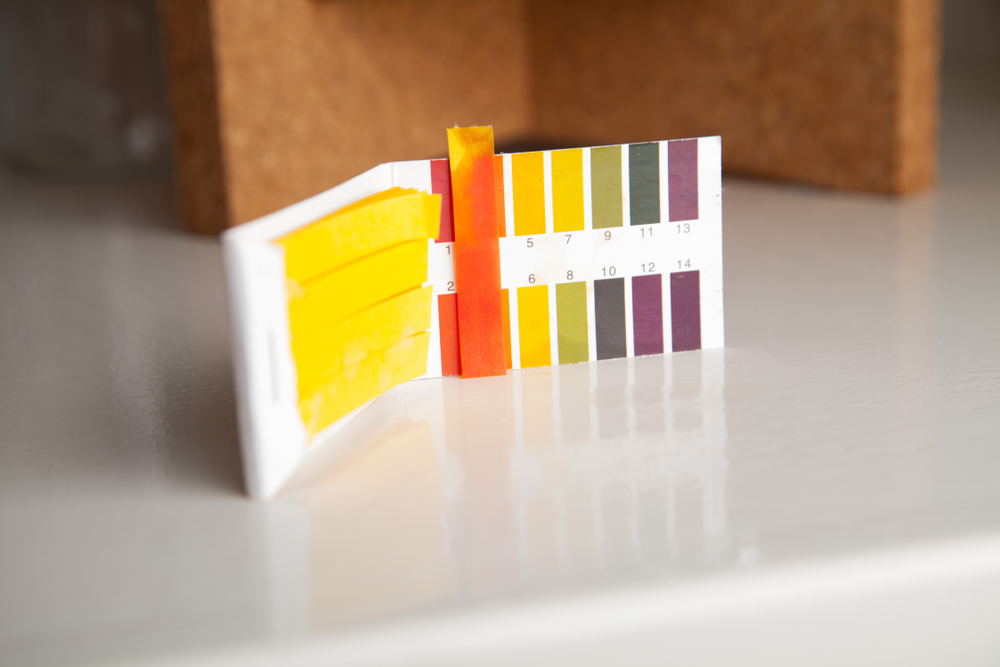At the end of the brewing process, kombucha has a pH between 2.5 and 3.5. The acidity of kombucha makes it the perfect environment for good bacteria to thrive. Kombucha is known to benefit those with acid reflux, help maintain a healthy gut, and improve overall wellness.
Table of Contents
What Is the pH Level of Kombucha?
Kombucha has a pH range of 2.5-3.5. The SCOBY (symbiotic culture of bacteria and yeast) consumes the sugar in the sweet tea as the brew ferments. The fermentation produces ethanol, which turns into acid. Kombucha has acidity levels similar to lemonade, apple cider vinegar, and grapefruit.
The low pH of kombucha creates an acidic environment where harmful bacteria cannot survive. However, this environment is perfect for good bacteria and yeast to grow. The exact pH of kombucha depends on brew time, the type of tea, the sugar content, and the temperature of the environment where it is brewed.
If you want to test the pH level of your homebrewed kombucha, get test strips. Knowing the pH of your brew will give you an insight into its health, but don’t rely solely on this number. Taste it and visually inspect it often. Kombucha, with a lower pH of around 2.5, tastes very tart. Kombucha, with a higher pH of about 3.5, tastes sweet.

Is Kombucha Good for Your Digestive System?
Yes—kombucha contains probiotics, antioxidants, and organic acids that are helpful for your digestive system. Acids like acetic acid and gluconic acid form during the fermentation process. These acids help fight the growth of harmful bacteria.
Like many fermented drinks, kombucha also has different strains of the probiotic Lactobacillus. One strain, called Lactobacillus acidophilus, helps balance good and bad bacteria in your digestive system and improves gut health.
Does Kombucha Raise or Lower Your Body’s pH?
It’s important to know that acidic foods don’t always make your body more acidic. Some foods, like lemons, are classified as acidic; they have a pH of about 2. Other foods are classified as acidic because they create an acidic environment in your body. Animal proteins, for instance, break down into amino acids, which turn acidic in the body.
Kombucha, like lemons, is acidic. However, both have been shown to help alkalize your body, potentially raising your pH, because of how these foods break down. Eating alkalizing foods may help your body maintain an average pH level.
Is Kombucha Good for Acid Reflux?
Drinking kombucha can be beneficial for treating acid reflux because:
- Kombucha has probiotics and acids which can help balance stomach acid.
- The lactic acid in kombucha can help promote healthy digestion and prevent inflammation in your gut.
- Kombucha has acetic acid, which helps kill harmful microorganisms in your gut.
- Kombucha is high in Vitamin B. These vitamins help your gut by controlling the production of stomach acids.
Sometimes, however, the combination of acids, alcohol, and caffeine can worsen acid reflux. Acetic acid can irritate your esophagus and stomach lining. Additionally, because the tea is carbonated, it can cause bloating and gas. Monitor your body and see if kombucha helps your acid reflux.
When drinking kombucha to combat acid reflux:
- Consume your kombucha at least one hour before laying down—this will give the acids and carbonation time to move through your body.
- Drink kombucha with a meal—have something in your stomach to buffer the acids.
What Are the Benefits of Drinking Kombucha?
Kombucha provides your body with numerous health benefits. This fermented tea can help support your overall health by providing a natural energy source and an alternative to soda. Kombucha also:
- Contains antioxidants—green tea and black tea contain antioxidants that help protect cells from damage.
- Can help maintain proper levels of beneficial and harmful bacteria in your body.
- Can help support a healthy heart by lowering bad cholesterol and raising good cholesterol.
- May aid your weight loss goals—tea can help boost your metabolism, helping you burn more calories.
- Slows digestion to keep blood sugar from spiking.
- Supports a healthy gut with probiotics.
Who Should Not Drink Kombucha?
While kombucha can be beneficial for many people, kombucha may not be suitable for you. Since it is a raw, unpasteurized food, it may not be safe for the following people:
- People with diabetes
- Pregnant women
- Those with compromised immune systems
- Those with stomach ulcers
- Women who are nursing
- Young children

